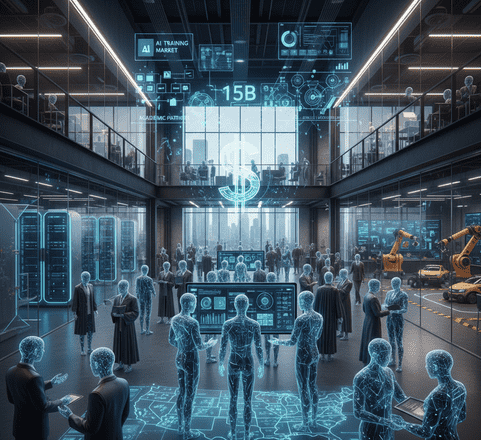What Makes AI Training Programs Different from Traditional IT Courses
The world of technological education is changing faster than ever. While traditional IT courses once ruled the tech training space, today’s professionals are turning to AI training programs to stay competitive.
Why? Because the future of work is powered by artificial intelligence. Organizations across every sector — from healthcare to finance — are seeking talent that understands AI tools, ethics, and implementation.
In this article, we’ll break down what truly sets AI training programs apart from conventional IT learning, how they’re designed to keep pace with innovation, and why partnering with an authorized training partner could accelerate both your learning and business growth.
1. From Coding to Cognition: The Core Difference
Traditional IT courses focus heavily on programming languages, networks, or databases — teaching how systems function. But AI training programs go deeper. They teach machines how to think.
That means exploring concepts like:
- Machine learning and neural networks
- Natural language processing (NLP)
- Predictive analytics
- Ethical AI frameworks
For instance, instead of just writing software, learners in AI programs might train a model to detect anomalies in financial transactions. This thinking layer is what makes AI programs revolutionary.
2. Hands-On, Project-Based Learning
Unlike many IT courses that rely on theoretical exams, AI training programs emphasize real-world application.
Learners often:
- Work on live AI projects
- Analyze real datasets
- Collaborate in virtual AI labs
- Build deployable models
This shift makes training far more practical. You don’t just learn concepts — you learn to apply AI to solve business challenges.
For example, an AI student might use image recognition to help a retail company improve customer experience, whereas a traditional IT student might simply learn how to manage that company’s database.
3. Dynamic Curriculum That Evolves with the Industry
Traditional IT courses tend to have fixed curricula updated once every few years. AI training programs, however, evolve constantly.
They stay aligned with:
- The latest AI frameworks (like TensorFlow, PyTorch, Hugging Face)
- Industry case studies
- Compliance updates and AI ethics policies
This agility ensures learners are job-ready for today’s rapidly changing AI-driven landscape.
As a result, companies prefer graduates of modern AI training programs — they bring relevant, practical expertise rather than outdated theoretical knowledge.
4. Certifications with Global Recognition
Most reputable AI training programs are offered through authorized training partners. These partners are officially approved by certification providers to deliver AI learning in line with industry standards.
Becoming an authorized training partner adds credibility — both for institutions and learners. It ensures that:
- The curriculum is vetted and up to date
- Trainers are certified experts
- Students receive verifiable credentials recognized globally
For instance, AI CERTs®’ Authorized Training Partner network delivers structured AI certifications across business, security, data, and ethical domains. Learners gain not just skills, but a competitive career edge.
5. Personalized Learning Paths for Every Role
AI learning isn’t one-size-fits-all. Modern programs are built around roles, not just topics.
Whether you’re an engineer, business leader, or educator, AI courses are now designed to meet you where you are:
- AI for Developers: Model training, automation, and APIs
- AI for Business Leaders: Strategy, governance, and ROI
- AI for Security Experts: Threat prediction, defense models
- AI for Educators: AI curriculum integration
This personalization makes AI education much more relevant — something traditional IT courses rarely achieve.
6. Collaboration and Networking Opportunities
In AI learning environments, collaboration is key. Learners engage in online communities, hackathons, and live AI projects.
These experiences don’t just teach AI — they connect professionals worldwide.
Participants exchange datasets, discuss model performance, and even co-develop solutions.
Such exposure helps students move beyond technical mastery — they learn teamwork, ethical reasoning, and AI governance, making them more valuable to employers.
7. Bridging Learning and Business: Becoming a Partner
For institutes or professionals in education, becoming an authorized training partner is a strategic move.
Here’s why:
- You get access to accredited AI curriculum and teaching resources
- You can deliver certified AI courses under a global brand
- You join a fast-growing network of AI educators and institutions
In short, when you become a partner, you don’t just teach AI — you empower others to succeed in the AI economy.
💡 Tip: Explore how to become an authorized AI training partner at AI CERTs® and join the growing ecosystem of AI-driven educators.
8. Why AI Training Is the Future of Learning
AI is redefining not only technology but also how we learn.
Here’s the reality:
- AI courses teach adaptability — not just skills
- They focus on creativity, ethics, and impact
- Learners graduate ready for real-world AI deployment
Meanwhile, traditional IT education struggles to keep up with AI’s exponential pace.
That’s why governments, universities, and corporations are investing heavily in AI training programs — not just as courses but as strategic enablers for innovation.
Conclusion
In a world driven by data and automation, AI training programs are no longer optional — they’re essential.
They provide hands-on, evolving, and role-specific learning that prepares you for the intelligent systems shaping our future. Unlike traditional IT courses, they go beyond code — they build cognitive capability.
Whether you’re looking to advance your career or become a partner in AI education, now is the time to join the transformation.
👉 Explore related AI certifications and start your journey toward becoming a leader in the era of intelligent innovation.
Recent Blogs

FEATURED
Why AI Governance & Literacy Must Be at the Heart of University Curricula and Corporate Learning
February 7, 2026
FEATURED
Why the AI Instructor Shortage Is a Strategic Opportunity for Partners
February 7, 2026
FEATURED
The $15B U.S. AI Training Market- Where Enterprise & Academic Partners Fit In
February 7, 2026
FEATURED
HP’s Future of Work Program- What Universities and Training Providers Must Know
February 7, 2026
FEATURED
AI Training Must Be Rigor-Driven- What Quality Standards Partners Should Adopt
February 7, 2026

